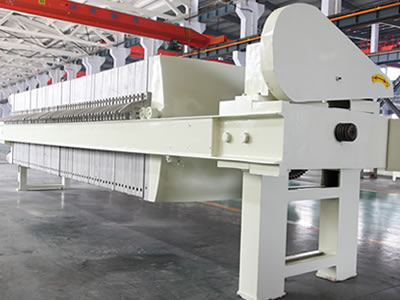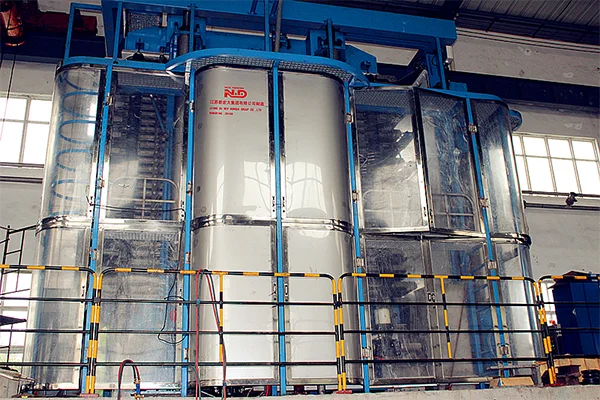Overview of Membrane Automatic Filter Press Technology
Membrane automatic filter press tech is a total game-changer for splitting solids from liquids, outshining old-school filtration systems. It works through a bunch of steps. You got slurry feeding, membrane squeezing, maybe some cake washing, another squeeze, air drying, and then the cake gets dumped out automatically.
- Step 1-Feed: The slurry is transported to the slurry chamber of each filter frame through the pipeline, passes through the filter cloth, the filter cake begins to form, and the filtrate enters the filtrate pipe for discharge.
- Step 2-Diaphragm squeeze: High-pressure water is passed into the high-pressure pipe and enters the top of the diaphragm. The pipe expands and squeezes the filter cake downward to further discharge the liquid.
Key Components and Operating Principles
The membrane plates are at the heart of this system. These plates expand under high pressure to compress the formed cake, thereby enhancing moisture removal. The system is fully automated with integrated PLC controls for seamless operation. The maximum pressure reaches 16 kg, and the air drying process (mainly relying on air drying) makes the filter cake moisture content extremely low (the moisture content of phosphogypsum filter cake can reach 10%, which is much lower than the 25% ), and even the drying process in the traditional process can be eliminated.
Comparison With Conventional Filter Press Systems
Traditional chamber presses rely solely on mechanical compression without dynamic pressure modulation. In contrast, membrane systems apply additional squeezing after initial filtration, significantly improving dewatering performance and cycle efficiency.
Enhanced Filtration Efficiency
The innovation in membrane technology leads directly to improved throughput and reduced operational delays—key metrics in industrial filtration.
Faster Cycle Times and Reduced Downtime
By integrating sequential operations such as second-stage squeezing and air drying into one automated cycle, membrane presses minimize idle time between batches. Fully automatic control and continuous operation ensure that downtime is virtually eliminated during transitions.
Higher Filtration Pressure for Improved Cake Dryness
High-pressure membranes achieve superior dryness levels in filter cakes. The moisture content of phosphogypsum filter cake can reach 10%, which is much lower than the 25%, resulting in lighter waste loads and reduced post-processing requirements.
Energy and Cost Optimization
Beyond performance gains, these systems offer tangible cost benefits by optimizing energy consumption and reducing material usage.
Lower Energy Consumption Through Efficient Dewatering
Efficient dewatering reduces or eliminates thermal drying stages entirely. Much lower moisture in the cake, even the traditional drying process can be eliminated to save energy if possible. This translates into substantial energy savings over time.
Reduction in Chemical Usage and Sludge Disposal Costs
Drier cakes not only weigh less but also require fewer chemicals for treatment or stabilization. As a result, disposal becomes more economical while maintaining compliance with environmental regulations.
Automation and Process Control Advantages
Automation lies at the core of membrane press superiority—offering both consistency and intelligence in operation.
Integration With PLC Systems for Full Automation
These systems are equipped with advanced PLC controls that manage every step—from feed to discharge—with minimal manual oversight. Touch screen-PLC control; mechatronic system seamlessly connected; measurement and control system runs reliably, ensuring reliable performance across diverse operating conditions.
Consistent Filtration Performance
Automated cloth washing systems regenerate filter media without water consumption or manual labor. Automatically wash the filter cloth alternately on the front and back sides, and regenerate it with efficient self-cleaning, ensuring consistent filtration quality across cycles.
Durability and Maintenance Benefits
Membrane presses really shine because they’re super tough, especially in rough industrial settings. They’re built with top-notch stuff like modified reinforced polypropylene. That makes them hold up great against chemicals and physical wear. So, you don’t need to replace parts as often. Plus, their upkeep is a breeze thanks to hydraulic quick-open mechanisms. These let you get to the insides fast. The hydraulic quick-open device pops the head open nice and quick, saving you cash and keeping production hiccups to a minimum.
Application Versatility Across Industries
The adaptability of membrane automatic filter presses makes them ideal across sectors requiring high-efficiency separation processes.
Suitability for High-Solids, High-Viscosity Slurries
These systems excel where others struggle—handling slurries with low solid content or high viscosity thanks to their variable pressure capabilities. It can meet filtration of medium of low solids, high viscosity; difficult to filter, etc.
Compliance With Stringent Environmental Standards
Closed-loop designs prevent leakage or emissions during operation. Running in a full enclosure, long life of cloth, no leakage and environmental pollution, ensuring adherence to strict environmental protocols.
Advantages of NHD’s Automatic Filter Press Solutions
If you’re looking for a partner that delivers robust engineering with tailored solutions across industries like chemical processing or wastewater treatment, consider exploring NHD’s advanced filtration systems. Their vertical automatic pressure filters are engineered for maximum efficiency under demanding conditions.
Proprietary Design Features From NHD Engineering
HDLY Vertical Automatic Pressure Filter is developed by NHD on the basis of assimilating and digesting the latest technology of press filters at home and abroad. With features like continuous operation, compact structure design, optional washing modules and self-diagnosis alarms, NHD stands out as a leader in smart filtration technologies.
Tailored System Configurations for Complex Industrial Needs
NHD offers multiple models ranging from small-scale units to large installations up to 600 m² area capacity—all configured using material-specific test results from their dedicated lab facilities. Learn more about how NHD tailors its solutions based on your unique application needs. Welcome to contact NHD!
FAQ
Q: What makes a membrane automatic filter press better than conventional chamber presses?
A: It applies additional high-pressure squeezing after initial filtration, which significantly improves cake dryness while reducing cycle times compared to conventional systems that rely solely on static compression.
Q: Can these presses handle viscous or hard-to-filter slurries?
A: Yes. The system is designed specifically for challenging materials including those with low solids or high viscosity by leveraging multi-stage pressure cycles for optimal separation performance.
Q: How does automation contribute to cost savings?
A: Full PLC integration allows unattended operation including self-cleaning cycles which reduces labor costs while maintaining consistent output quality over extended periods without intervention.



